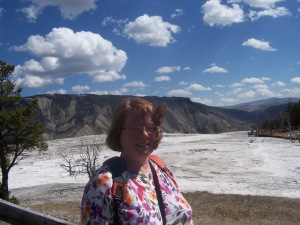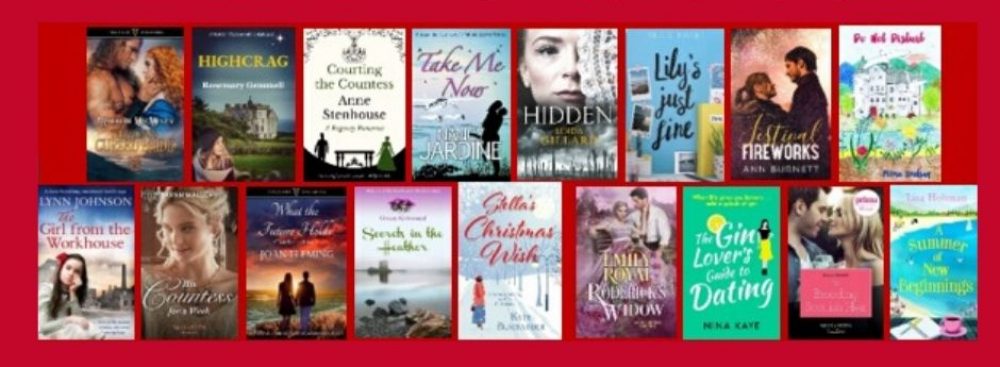
Weather So the picture of me in Yellowstone, US, has more than a few clouds in the sky. It was, however, warm and sunny, too. Perfection. When asked the next day the young man on our raft said he expected the snow to arrive in the next week or two – never long after Labour Day.
And that’s the thing about weather it’s at the same time regular and unpredictable. That it will blanket the national parks for months is certain, but when that fall will come less so. That it will thaw in the spring is equally sure, but again when that will happen less so.
Using weather in writing is tricky, but oh so tempting. I recently recommended to my book group (we take it in turn to recommend) The Taxidermist’s Daughter by Kate Mosse. She uses the landscape of low-lying marsh around Chichester and creates a coming storm. She is at pains in the acknowledgements to state the storm was a fictional one. There are, however, many such in British history and not all that distant history either so we can feel that wind as it howls through the darkness and the dragging effect of long wet skirts or clinging soaking trousers. We know enough to vicariously experience the rising level of hysteria that matches the rising flood waters. And to thank our lucky stars when we wake in the morning to a cleansed countryside and a moral cleansing, too. DH Lawrence also used flooding to effect a cleansing.
Another sort of weather much exploited is over-bearing heat building to unbearable intensity before storm brings relief. Tennessee Williams, Arthur Miller, Graham Greene all use it in drama and prose. Evelyn Waugh used a storm at sea to allow his narrator and Julia to come together in Brideshead Revisited. Somehow their ability to avoid sea-sickness gave them a glamour and superiority that the fall from marital grace should have prevented.
Weather features close to the opening of my DAISY’S DILEMMA Daisy has been trapped in the great London house of her brother the earl for a week or more. She’s recovering from food poisoning and then when she might venture out summer thunder and lightening prevents it. Daisy’s mercurial temperament is sorely tried and, clearly, she needs a strong arm to assist her into the world outside her pampered existence. Did I do it consciously? How does one know where anything in fiction comes into the brain from? Once it was down, however, I really liked it. Drama Mood and Revelation.
My fellow rounders’ writers are listed below. Do visit and see what they think, too. What do you think? Is weather used wisely in fiction? Do you use it in yours?
Skye Taylor http://www.skye-writer.com/blogging_by_the_sea
Rachael Kosinski http://rachaelkosinski.weebly.com/
Beverley Bateman http://beverleybateman.blogspot.ca/
Connie Vines http://connievines.blogspot.com/
Anne Stenhouse https://annestenhousenovelist.wordpress.com/
Helena Fairfax http://helenafairfax.com/
Judith Copek http://lynx-sis.blogspot.com/
Dr. Bob Richhttps://bobrich18.wordpress.com/2016/04/26/oh-the-weather/
Victoria Chatham http://victoriachatham.blogspot.ca
Kay Sisk http://kaysisk.blogspot.com
Rhobin Courtright http://www.rhobinleecourtright.com

What great examples you gave us of weather related stories. Weather affects us all, so readers can identify immediately with the mood it induces in characters. Funny how we all want sunny days, but I like a dark, rainy day once in awhile to have an excuse to curl up and read!
LikeLike
Hi JQ, thank you. I know what you mean about weather to curl up in, Anne
LikeLike
I like the regular and unpredictable at the same time, and the many examples as well. Enjoyed your post, Anne.
LikeLike
Hi rhobin, sorry to be so tardy, but I was down south and the site wouldn’t let me in. Thanks for dropping by, Anne
LikeLike
I’m liking everyone’s examples so much. The Brits have often been accused of talking about nothing but the weather. So not fair! Weather happens everywhere and affects everyone whether in fact or fiction.
LikeLike
Hullo Victoria, yes, it does. All the more so in recent years, too. Anne
LikeLike
I smiled when I realized you were discussing all the many English bad-weather days. Partly because I spent 19 days in England in August the year my son graduated high school. We had a fantastic two plus weeks beginning with the Arts Festival in Edinburg and ending with four days in London via Yorkshire, Wales, Cornwall and Dover with stops all along the way. People had warned me ahead of time that it was always raining in England, but ever the optimist, I didn’t believe them. And as our vacation went on we only had to retreat to indoor activities on one day (which we spent touring Prinny’s Brighton Pavilion.) Anyway, I came home thinking we’d had marvelous weather nearly the whole time. THis was before digital cameras. Imagine my surprise when I developed all my photos and discovered there were only about 3 days with clear blue skies. I guess were having a fantastic time in spite of the gloomy overcast skies!
LikeLike
Hullo Skye, Glad your UK vivit was so successful, but the starting with the Edinburgh Festival, you chose well! Anne
LikeLike
I love that photo, Anne. The clouds look like something out of a painting. Hard to believe snow was on the way.
I’d forgotten that episode in Brideshead Revisited. It’s a great scene. Funnily enough, I mentioned Evelyn Waugh in my own post on this subject. It was through him I first discovered how you could use the weather as a symbol.
Great post!
LikeLike
Hullo Helena, I managed to read your post and now actually know what pathetic fallacy is. thank you. A Handful of Dust is the next read in my book group and no doubt why he was in my mind. Anne
LikeLiked by 1 person
I loved the examples you used in describing weather. And you also used it well in Daisy’s Dilemma. I definitely need to pay more attention to weather, how it can affect a scene and it’s symbolization.,
LikeLike
Hi Beverley, thanks for dropping in. I know you have tropical storms – I’d hate to be out in one. Experienced a typhoon in Vietnam once and was afraid of the power of nature. Anne
LikeLike
Anne, I always love hearing about how the Round Robin theme relates to your books. And the example of how even the calm/heat BEFORE a storm can provide loads of tension. 🙂
LikeLike
Hi Rachael, thank you for dropping in. I do think we pick up a vibe from weather and, while one should definitely avoid ‘It was a dark and stormy night’, there’s a great resource there. Anne
LikeLike
Good post. I’m always interested in how other writers use weather, food, clothing–all the stuff of everyday life to enhance their writing.
LikeLike
Hi Judy, Yes, it’s one of the pleasures of being a writer that one can gaze out on torrential rain and think, ‘Mnm! Does my heroine really need to catch the next plane (stage-coach in most of my books) orlinger in the inn and meet…’ Well, who? Thanks for dropping in, Anne
LikeLike